-
 Bitcoin
Bitcoin $112400
-1.07% -
 Ethereum
Ethereum $3409
-3.27% -
 XRP
XRP $2.784
-6.60% -
 Tether USDt
Tether USDt $0.9997
-0.03% -
 BNB
BNB $739.3
-2.09% -
 Solana
Solana $158.0
-2.90% -
 USDC
USDC $0.9998
-0.02% -
 TRON
TRON $0.3213
-0.94% -
 Dogecoin
Dogecoin $0.1929
-5.01% -
 Cardano
Cardano $0.6974
-2.82% -
 Hyperliquid
Hyperliquid $36.69
-2.31% -
 Sui
Sui $3.327
-4.80% -
 Stellar
Stellar $0.3672
-5.18% -
 Chainlink
Chainlink $15.65
-3.07% -
 Bitcoin Cash
Bitcoin Cash $525.0
-1.68% -
 Hedera
Hedera $0.2291
-6.00% -
 Avalanche
Avalanche $20.91
-2.96% -
 Ethena USDe
Ethena USDe $1.000
0.00% -
 Toncoin
Toncoin $3.520
-1.12% -
 UNUS SED LEO
UNUS SED LEO $8.968
0.14% -
 Litecoin
Litecoin $105.7
0.26% -
 Shiba Inu
Shiba Inu $0.00001181
-1.79% -
 Polkadot
Polkadot $3.492
-2.08% -
 Uniswap
Uniswap $8.800
-3.10% -
 Dai
Dai $0.9999
-0.01% -
 Monero
Monero $289.9
-3.17% -
 Bitget Token
Bitget Token $4.243
-1.27% -
 Pepe
Pepe $0.00001006
-3.67% -
 Cronos
Cronos $0.1248
-5.68% -
 Aave
Aave $249.7
-2.50%
What are the risks of buying a Bitcoin ETF?
Bitcoin ETFs offer exposure to Bitcoin's price without direct ownership, but they come with risks like market volatility, regulatory uncertainty, and security threats.
Mar 27, 2025 at 03:21 am
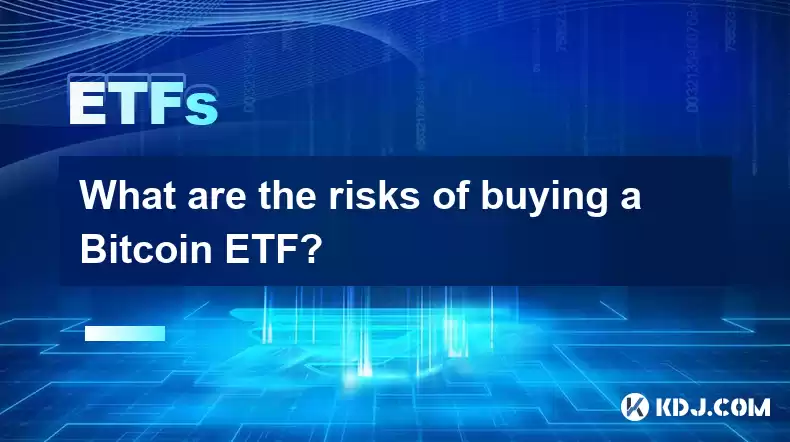
Understanding the Potential Downsides of Bitcoin ETF Investment
A Bitcoin Exchange-Traded Fund (ETF) seeks to track the price of Bitcoin, offering investors exposure to the cryptocurrency without directly holding it. While offering convenience, several risks are inherent in investing in a Bitcoin ETF. These risks stem from both the nature of Bitcoin itself and the structure of the ETF. Understanding these risks is crucial before investing.
Market Volatility and Price Fluctuations
Bitcoin's price is notoriously volatile. Sharp price swings are common, and these fluctuations can significantly impact the value of a Bitcoin ETF. A sudden drop in Bitcoin's price can lead to substantial losses for ETF investors, even in a short timeframe. This volatility is amplified by factors like regulatory uncertainty, market sentiment, and technological developments within the cryptocurrency space.
Regulatory Uncertainty and Legal Challenges
The regulatory landscape surrounding cryptocurrencies, including Bitcoin, remains uncertain in many jurisdictions. Changes in regulations could negatively impact the operation and performance of a Bitcoin ETF. Legal challenges, such as those related to the classification of Bitcoin as a security or commodity, could also affect its price and the ETF's ability to operate effectively.
Security Risks and Hacking
While a Bitcoin ETF mitigates some of the risks associated with directly holding Bitcoin (like losing your private keys), it doesn't eliminate all security concerns. The ETF itself could be a target for hacking or cyberattacks, potentially leading to losses for investors. The underlying custodian holding the Bitcoin reserves is also subject to security risks. Thorough due diligence on the ETF's security protocols is essential.
Counterparty Risk and Fund Management
Investing in a Bitcoin ETF exposes investors to counterparty risk. This refers to the risk that the ETF issuer or the custodian holding the Bitcoin might default on its obligations. Furthermore, the fund manager's investment strategies and fees need careful consideration. Poor fund management can lead to underperformance relative to the Bitcoin price.
Liquidity Risk and Trading Costs
While ETFs generally offer better liquidity than directly trading Bitcoin, liquidity risk still exists, particularly during periods of high market volatility or low trading volume. This can make it difficult to buy or sell shares of the ETF at the desired price. Additionally, trading costs, including commissions and expense ratios, can erode returns over time.
Operational Risks and Internal Controls
Like any investment vehicle, Bitcoin ETFs are susceptible to operational risks. These include errors in pricing, calculation of net asset value (NAV), and other operational aspects of the fund. Effective internal controls are crucial to mitigate these risks. Investors should review the ETF's prospectus for details on its operational structure and risk management procedures.
Lack of Diversification and Concentration Risk
Investing solely in a Bitcoin ETF means concentrating your investment in a single, volatile asset. This lack of diversification increases the overall risk of your portfolio. A significant drop in Bitcoin's price could severely impact your investment returns. Diversification across different asset classes is crucial for managing risk.
Inflation and Macroeconomic Factors
Bitcoin's price can be influenced by macroeconomic factors such as inflation, interest rates, and global economic conditions. Inflationary pressures might drive investors towards alternative assets, potentially boosting Bitcoin's price. Conversely, rising interest rates could reduce demand for riskier assets like Bitcoin, leading to price declines.
Tax Implications and Reporting
The tax implications of investing in a Bitcoin ETF vary depending on your jurisdiction and individual circumstances. Capital gains taxes may apply when selling shares of the ETF at a profit. Understanding the tax implications is crucial for effective financial planning. Consult with a tax advisor to ensure compliance.
How to Mitigate Risks
- Thorough Research: Carefully research the specific Bitcoin ETF you are considering, paying close attention to its prospectus, fees, and underlying holdings.
- Diversification: Don't put all your eggs in one basket. Diversify your investment portfolio across different asset classes to reduce overall risk.
- Risk Tolerance: Only invest an amount you are comfortable losing. Bitcoin is a highly volatile asset.
- Due Diligence on the Issuer: Investigate the reputation and financial stability of the ETF issuer and its custodian.
- Stay Informed: Keep abreast of developments in the cryptocurrency market and regulatory landscape.
Frequently Asked Questions
Q: Are Bitcoin ETFs safer than directly holding Bitcoin?
A: Bitcoin ETFs offer some advantages in terms of security and convenience, but they don't eliminate all risks. They still expose you to market volatility and other risks associated with Bitcoin. Directly holding Bitcoin carries additional risks like losing your private keys.
Q: What are the fees associated with Bitcoin ETFs?
A: Bitcoin ETFs have various fees, including expense ratios, management fees, and trading commissions. These fees can impact your overall returns. Carefully review the ETF's prospectus for details on all applicable fees.
Q: How do I buy a Bitcoin ETF?
A: You can typically buy Bitcoin ETFs through a brokerage account that supports ETF trading. The process is similar to buying other ETFs.
Q: Are Bitcoin ETFs regulated?
A: The regulatory status of Bitcoin ETFs varies by jurisdiction. Some jurisdictions have approved Bitcoin ETFs, while others are still considering their regulation. Check the regulatory status in your region before investing.
Q: What is the difference between a Bitcoin ETF and a Bitcoin futures ETF?
A: A Bitcoin ETF typically holds Bitcoin directly, while a Bitcoin futures ETF invests in Bitcoin futures contracts. This difference impacts the price tracking and risk profile. Futures ETFs can be more complex and may not perfectly track the spot price of Bitcoin.
Disclaimer:info@kdj.com
The information provided is not trading advice. kdj.com does not assume any responsibility for any investments made based on the information provided in this article. Cryptocurrencies are highly volatile and it is highly recommended that you invest with caution after thorough research!
If you believe that the content used on this website infringes your copyright, please contact us immediately (info@kdj.com) and we will delete it promptly.
- BlockDAG, SEI, Ethena: Top Crypto Performers Under the Microscope
- 2025-08-03 10:50:16
- Bitcoin Blasts Past $119K: How Institutional Adoption and Macro Shifts Fuel the Fire
- 2025-08-03 10:55:16
- Crypto, Grok, and August: Decoding the Latest Trends and Insights
- 2025-08-03 11:10:16
- Crypto, Phishing, and Your Wallet: A New Yorker's Guide to Staying Safe
- 2025-08-03 10:30:16
- Troller Cat Meme Coin Presale Soars: A New King in the Crypto Jungle?
- 2025-08-03 10:30:16
- Grayscale, Altcoin Trust, and Mid-Cap Mania: What's the Deal?
- 2025-08-03 08:50:16
Related knowledge
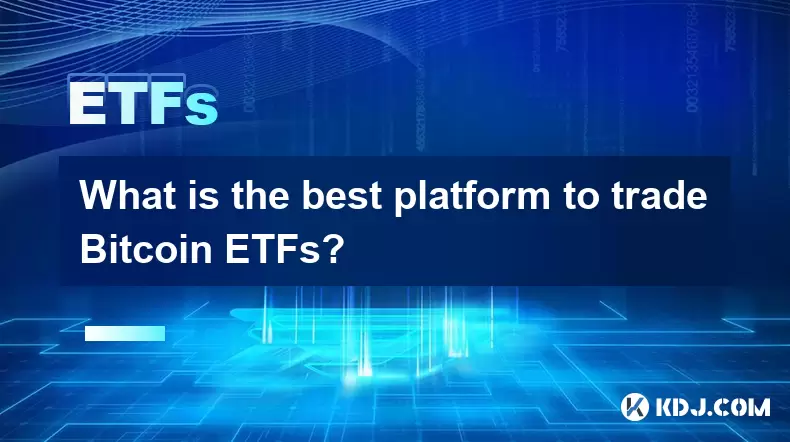
What is the best platform to trade Bitcoin ETFs?
Jul 23,2025 at 04:14am
Understanding Bitcoin ETFs and Their Role in TradingBitcoin Exchange-Traded Funds (ETFs) have gained significant traction among traditional and crypto...
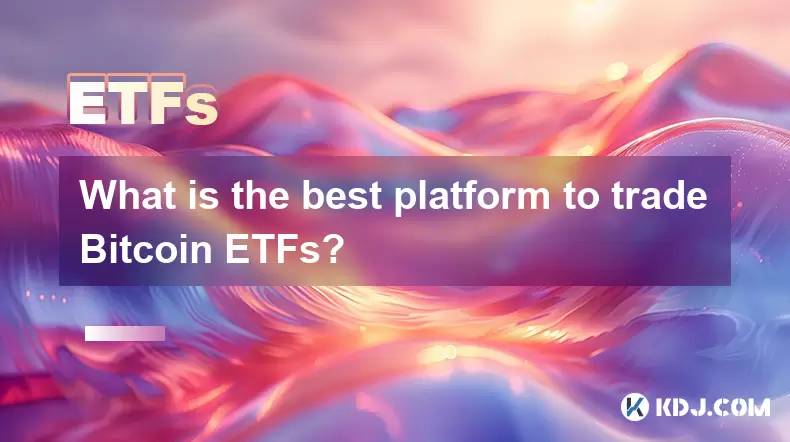
What is the best platform to trade Bitcoin ETFs?
Jul 17,2025 at 03:50pm
Understanding Bitcoin ETFs and Their Role in the MarketBitcoin Exchange-Traded Funds (ETFs) are investment vehicles that track the price of Bitcoin wi...
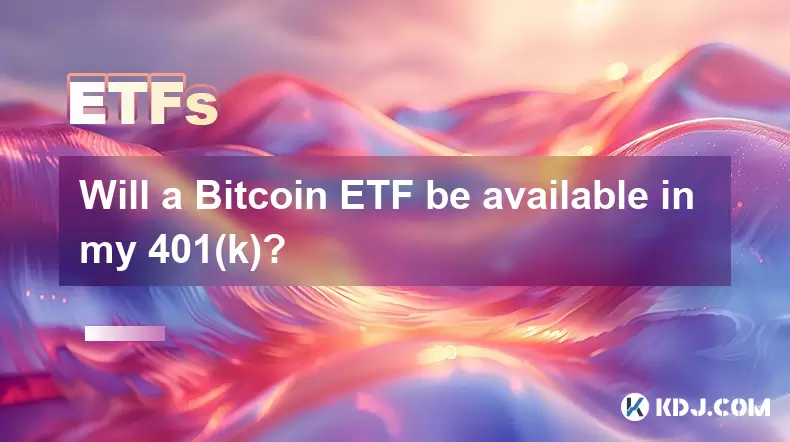
Will a Bitcoin ETF be available in my 401(k)?
Jul 17,2025 at 10:42pm
What is a Bitcoin ETF?A Bitcoin ETF (Exchange-Traded Fund) is an investment vehicle that tracks the price of Bitcoin without requiring investors to di...
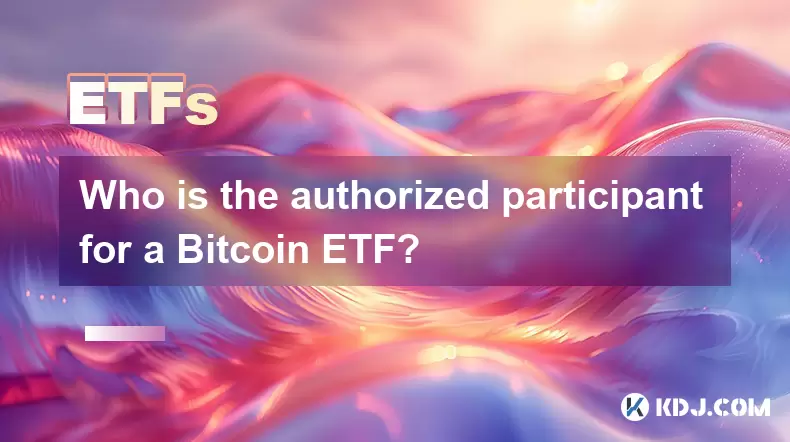
Who is the authorized participant for a Bitcoin ETF?
Jul 18,2025 at 12:42am
Understanding the Role of Authorized Participants in Bitcoin ETFsIn the context of Bitcoin Exchange-Traded Funds (ETFs), an authorized participant (AP...
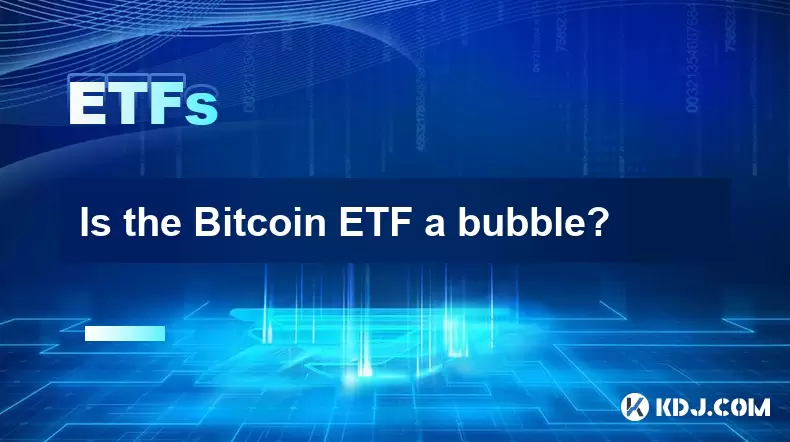
Is the Bitcoin ETF a bubble?
Jul 20,2025 at 06:57am
Understanding the Bitcoin ETF ConceptA Bitcoin Exchange-Traded Fund (ETF) is a financial product that aims to track the price of Bitcoin without requi...
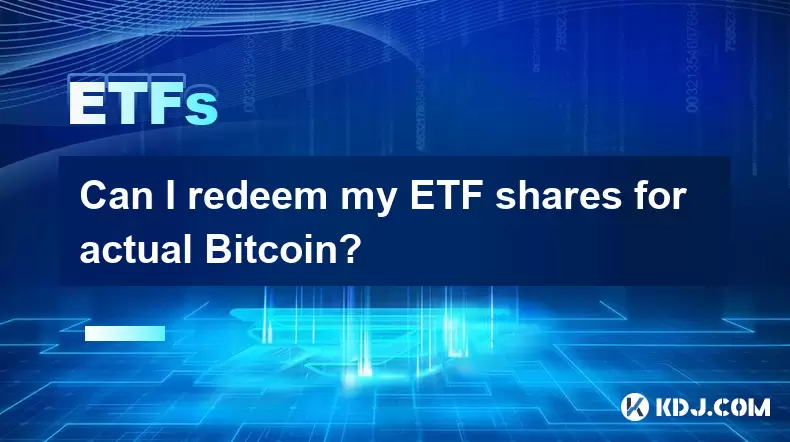
Can I redeem my ETF shares for actual Bitcoin?
Jul 17,2025 at 03:14pm
Understanding ETF Shares and Their Relation to BitcoinExchange-Traded Funds (ETFs) have become a popular investment vehicle for those looking to gain ...

What is the best platform to trade Bitcoin ETFs?
Jul 23,2025 at 04:14am
Understanding Bitcoin ETFs and Their Role in TradingBitcoin Exchange-Traded Funds (ETFs) have gained significant traction among traditional and crypto...

What is the best platform to trade Bitcoin ETFs?
Jul 17,2025 at 03:50pm
Understanding Bitcoin ETFs and Their Role in the MarketBitcoin Exchange-Traded Funds (ETFs) are investment vehicles that track the price of Bitcoin wi...

Will a Bitcoin ETF be available in my 401(k)?
Jul 17,2025 at 10:42pm
What is a Bitcoin ETF?A Bitcoin ETF (Exchange-Traded Fund) is an investment vehicle that tracks the price of Bitcoin without requiring investors to di...

Who is the authorized participant for a Bitcoin ETF?
Jul 18,2025 at 12:42am
Understanding the Role of Authorized Participants in Bitcoin ETFsIn the context of Bitcoin Exchange-Traded Funds (ETFs), an authorized participant (AP...

Is the Bitcoin ETF a bubble?
Jul 20,2025 at 06:57am
Understanding the Bitcoin ETF ConceptA Bitcoin Exchange-Traded Fund (ETF) is a financial product that aims to track the price of Bitcoin without requi...

Can I redeem my ETF shares for actual Bitcoin?
Jul 17,2025 at 03:14pm
Understanding ETF Shares and Their Relation to BitcoinExchange-Traded Funds (ETFs) have become a popular investment vehicle for those looking to gain ...
See all articles

























































































